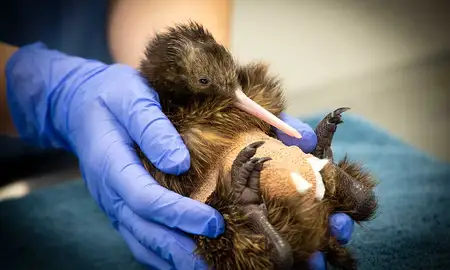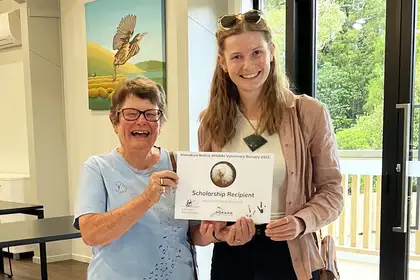
Lesley Christian with Sabine O’Neill-Stevens.
Considered a sacred taonga (treasure), Manukura hatched at Pūkaha National Wildlife Centre in 2011 and was an advocate for kiwi conservation. While residing in the Pūkaha nocturnal house for over nine years, she was also a regular visitor to Te Kunenga ki Pūrehuroa Massey University’s Wildbase Hospital. Due to complications relating to her reproductive cycle, Manukura passed away in late 2020, leaving a lasting impact on those who cared for her and instilling a passion for conservation in those who knew of her.
In collaboration with Pūkaha and Massey, the Manukura Memorial Veterinary Scholarship is fully funded by Lesley Christian and David Cleal, retired professionals and staunch supporters of conservation efforts in the Wairarapa region. As firm believers in education, Ms Christian and Mr Cleal were keen to support young people to follow their passion in a way which aligns with their love of conservation and with Pūkaha’s long term needs.
The Manukura Memorial Veterinary Scholarship seeks to provide a financial support bursary of up to $5,000 to assist one student in their third or fourth year of the Bachelor of Veterinary Science programme. Operated through Pūkaha, the scholarship recipient will be selected annually by trustees, with the support of the Wildbase staff. Successful recipients will have a demonstrated interest and involvement in Aotearoa New Zealand native wildlife medicine and conservation.
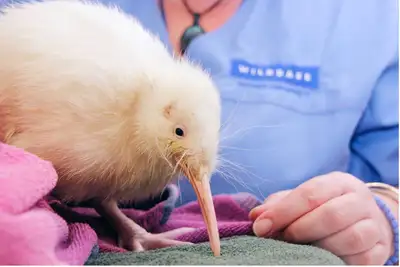
Manukura during one of her visits to Wildbase Hospital.
Sabine, who is about to start her fourth year with Tāwharau Ora School of Veterinary Science, says it’s a real privilege to be the first recipient.
“It’s exciting that there are more opportunities for students interested in working with wildlife. I’m very grateful for Lesley and David’s generosity and can’t wait to work alongside the rangers at Pūkaha as I know I’ll learn a lot from them.”
While there was tough competition, General Manager of Pūkaha Wildlife National Centre Emily Court says Sabine is a deserving recipient.
“It was a difficult decision, as we had many dedicated students and conservationists apply, but Sabine has a strong history of volunteering in the sector. Her plans to stay in New Zealand to continue her work with native species is also very exciting. For organisations like Pūkaha and for conservation in general, having up-and-coming veterinary practitioners with a particular interest and passion for native wildlife is essential.”
Describing herself as an ‘outdoorsy’ kid while growing up, Sabine says her passion for wildlife and conservation makes sense.
“Being in the bush is my happy place and I’ve always been an animal lover, so for me, wildlife medicine and conservation is the best of both words. During my time at the vet school, I’ve spent weekends resetting trap lines in the Ruahine Ranges with the Massey Wildlife/Conservation Club and Ruahine Whio Protectors. I’ve also been volunteering at Wildbase, have assisted with bird banding projects, and was part of a summer project helping with hoiho disease research.”
As well as providing a pathway for vet students to grow their expertise to ensure wildlife recovery efforts continue and succeed, Ms Court says the scholarship is also an opportunity to acknowledge their partnership with Wildbase.
“We’re so excited to join with Wildbase for this special scholarship as our partnership is invaluable. Pūkaha could not operate effectively without them. It’s wonderful to get to support a worthy vet student to continue their work in the field, while also celebrating the life of Manukura who was an incredible advocate for all New Zealand native birds.”
Director of Wildbase Professor Brett Gartrell says he’s excited for what the future holds through this scholarship and the continued partnership with Pūkaha.
“Our many years of collaboration with Pūkaha have led to great conservation gains for Aotearoa. The patients from Pūkaha are among some of the most vulnerable and rare birds in the country, which provides significant experience and learning for our trainee vets as they care for them. The generous bursary of the Manukura Memorial Veterinary Scholarship will help us ensure the next generation of veterinarians are empowered to continue this vital work.”
As for Sabine, she says her current goal is to continue enjoying the remaining two years of vet school.
“I’m loving it so far! I love that we get to learn about such a wide range of species, and I especially enjoy the practical parts of the course. My hope is to work with taonga species in some capacity in the future.”
Related news
New research underway to enhance kiwi welfare and conservation
A current PhD research project is endeavouring to identify safe and effective drugs to improve the treatment of coccidiosis in kiwi.
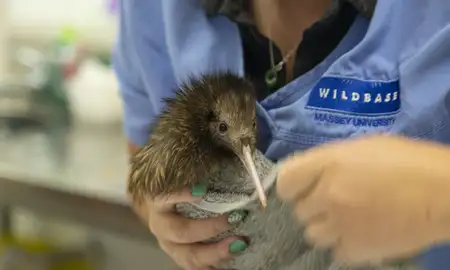
Wildbase: A pillar in Aotearoa New Zealand’s conservation efforts
For World Wildlife Conservation Day, we wanted to highlight the important work our Wildbase Hospital does in providing veterinary and scientific services to a number of conservation programmes around Aotearoa New Zealand.
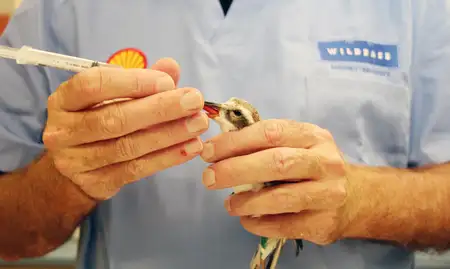
Kiwi saved during hatching at Wildbase
A kiwi chick has been saved by wildlife experts at Massey University and Pūkaha National Wildlife Centre after complications during hatching.
